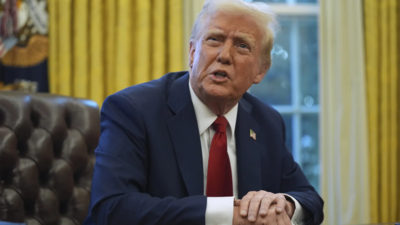
US President Donald Trump on Thursday reiterated his stance that
birthright citizenship
was originally intended for the children of slaves and for the whole world to "come in and pile" into the US. Speaking from the Oval Office,
Trump
expressed confidence that the Supreme Court would ultimately rule in his favour as he seeks to appeal a federal court's decision to strike down his
executive order
against birthright citizenship.
"Birthright citizenship was, if you look back when this was passed and made, that was meant for the children of slaves. This was not meant for the whole world to come in and pile into the United States of America," Trump told reporters.
Trump's executive order, issued on his first day in office, was blocked by a federal court in Seattle the following day. Despite the setback, Trump remains steadfast in his belief that his policy aligns with the original intent of the 14th Amendment, which he described as a "very good and noble" measure to protect former slaves.
"I just think that we'll end up winning that in the Supreme Court. I think we're going to win that case. I look forward to winning it," Trump said, adding that the US is one of the only countries in the world with unrestricted birthright citizenship.
Legislative push to restrict birthright citizenship
Meanwhile, a group of Republican senators, including Lindsey Graham, Ted Cruz, and Katie Britt, have introduced a bill in the US Senate to limit birthright citizenship. The proposed
Birthright Citizenship Act of 2025
aims to restrict automatic citizenship to children born to at least one parent who is a US citizen, a lawful permanent resident, or a member of the US armed forces.
According to the bill's sponsors, the current policy is a significant pull factor for illegal immigration and a potential risk to national security. Estimates from the
Center for Immigration Studies
suggest that between 225,000 and 250,000 children were born to
undocumented immigrants
in 2023, representing about seven per cent of all births in the US.
If enacted, the legislation would only apply to children born after its implementation date, marking a significant shift in US
immigration policy
.

 3 months ago
70
3 months ago
70




























 English (US)
English (US)